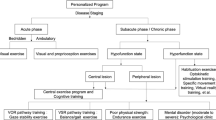Abstract
Objective
Patients suffered a lot from decompensated vestibular vertigo. Pharmacotherapy and vestibular rehabilitation training have been proven to be effective in prompting vestibular compensation. Routine rehabilitation training is faced with the challenges of patients’ compliance, completion, the average recuperation time and so on. This study is aimed to investigate advantages of short-term personalized vestibular rehabihitation at home guided by professional therapist.
Methods
A short-term personalized vestibular rehabilitation program (ST-PVR) was designed for patients with decompensated vestibular vertigo in this study.
Results
Patients experiencing the ST-PVR program showed significant improvement of Self-Rating Anxiety Scale (SAS), Dizziness Handicap Inventory (DHI), Activities-Specific Balance Confidence Scale (ABC) scores by the second follow-up (at 2nd week after treatment, P<0.05). However-improvement in the medication group occurred slightly later, DHI for 1 month and SAS for 2 months after treatment (P<0.05). Also, the improvement in the onset time of unilateral weakness (UW) at 2nd week after treatment in the personalized vestibular rehabilitation (PVR) group was faster than that in the medication group.
Conclusion
In general, the short-term PVR program showed great advantages by prompting vestibular compensation quickly and putting forward future direction for clinical treatment on decompensated vestibular vertigo.
Similar content being viewed by others
References
Murdin L, Schilder AG. Epidemiology of balance symptoms and disorders in the community: a systematic review. Otol Neurotol, 2015,36(3):387–392
Reis LR, Lameiras R, Cavilhas P, et al. Epidemiology of Vertigo on Hospital Emergency. Acta Med Port, 2016, 29(5):326–331
Neuhauser HK. The epidemiology of dizziness and vertigo. Handb Clin Neurol, 2016,137:67–82
Cullen K. Vestibular processing during natural self-motion: implications for perception and action. Nat Rev Neurosci, 2019,20(6):346–363
Ferrè ER, Longo MR, Fiori F, et al. Vestibular modulation of spatial perception. Front Hum Neurosci, 2013,7:660
Lacour M, Helmchen C, Vidal PP. Vestibular compensation: the neuro-otologist’s best friend. J Neurol, 2016,263(Suppl 1):S54–64
Parfenov VA, Golyk VA, Matsnev EI, et al. Effectiveness of betahistine (48 mg/day) in patients with vestibular vertigo during routine practice: The VIRTUOSO study. PLoS One, 2017,12(3):e0174114
Lindner M, Gosewisch A, Eilles E, et al. Ginkgo biloba Extract EGb 761 Improves Vestibular Compensation and Modulates Cerebral Vestibular Networks in the Rat. Front Neurol, 2019,10:147
Karapolat H, Celebisoy N, Kirazli Y, et al. Does betahistine treatment have additional benefits to vestibular rehabilitation? Eur Arch Otorhinolaryngol, 2010,267(8):1207–1212
Chen ZP, Zhang XY, Peng SY, et al. Histamine H1 Receptor Contributes to Vestibular Compensation. J Neurosci, 2019,39(3):420–433
Tighilet B, Léonard J, Watabe I, et al. Betahistine Treatment in a Cat Model of Vestibular Pathology: Pharmacokinetic and Pharmacodynamic Approaches. Front Neurol, 2018,9:431
Müller WE, Heiser J, Leuner K. Effects of the standardized Ginkgo biloba extract EGb 761 on neuroplasticity. Int Psychogeriatr, 2012,24(Suppl 1):S21–24
Kiewert C, Kumar V, Hildmann O, et al. Role of GABAergic antagonism in the neuroprotective effects of bilobalide. Brain Res, 2007,1128(1):70–78
Hall CD, Herdman SJ, Whitney SL, et al. Vestibular Rehabilitation for Peripheral Vestibular Hypofunction: An Evidence-Based Clinical Practice Guideline: FROM THE AMERICAN PHYSICAL THERAPY ASSOCIATION NEUROLOGY SECTION. J Neurol Phys Ther, 2016,40(2):124–155
Dunlap PM, Holmberg JM, Whitney SL. Vestibular rehabilitation: advances in peripheral and central vestibular disorders. Curr Opin Neurol, 2019,32(1):137–144
Kaylie D, Garrison D, Tucci DL. Evaluation of the patient with recurrent vertigo. Arch Otolaryngol Head Neck Surg, 2012,138(6):584–587
Tjernstrom F, Zur O, Jahn K. Current concepts and future approaches to vestibular rehabilitation. J Neurol, 2016,263(Suppl 1):S65–S70
Herdman SJ, Hall CD, Schubert MC, et al. Recovery of dynamic visual acuity in bilateral vestibular hypofunction. Arch Otolaryngol Head Neck Surg, 2007, 133(4):383–389
Yuan Q, Yu LS, Shi DM. et al. Anxiety and depression among patients with different types of vestibular peripheral vertigo. Medicine (Baltimore), 2015,94(5):e453
Dunstan DA, Scott N. Norms for Zung’s Self-rating Anxiety Scale. BMC Psychiatry, 2020,20(1):90
Schmid DA, Allum JHJ, Sleptsova M, et al. Relation of anxiety and other psychometric measures, balance deficits, impaired quality of life, and perceived state of health to dizziness handicap inventory scores for patients with dizziness. Health Qual Life Outcomes, 2020,18(1):204
Guan Q, Han HJ, Li YX, et al. Activities-specific Balance Confidence (ABC) Scale adapted for the mainland population of China. Clin Rehabil, 2012,26(7):648–655
Zhou YJ, Li QZ, Gao YQ, et al. Are Meniere’s disease patients with otolith organ impairment more likely to have balance dysfunction? Acta Otolaryngol, 2019, 139(11):977–981
Alfieri FM, Riberto M, Carreres AA, et al. Effectiveness of an exercise program on postural control in frail older adults. Clin Interv Aging, 2012,7:593–598
Pan Q, Zhang YX, Zhang SS, et al. Clinical features and outcomes of benign recurrent vertigo: A longitudinal study. Acta Neurol Scand, 2020,141(5):374–379
Kimura Y, Tsunoda A, Tanaka K, et al. Burden of vertigo at home: Risks for patients with vertigo. J Int Med Res, 2020,48(6):300060520929130
Author information
Authors and Affiliations
Corresponding author
Ethics declarations
None of the authors have potential conflict of interests to be disclosed.
Additional information
This study was supported by grants from the General Program of National Natural Science Foundation of China (No. 81870724), the Innovation Project of Shanghai Municipal Science and Technology Commission (No. 19441900400), and the Shanghai Municipal Health Commission (No. 201740018).
Rights and permissions
About this article
Cite this article
Ding, Cr., Gao, Yq., Zhou, Yj. et al. Advantages of Short-term Personalized Vestibular Rehabilitation at Home Guided by Professional Therapist for Treatment of Decompensated Vestibular Vertigo. CURR MED SCI 41, 687–694 (2021). https://doi.org/10.1007/s11596-021-2420-4
Received:
Accepted:
Published:
Issue Date:
DOI: https://doi.org/10.1007/s11596-021-2420-4




